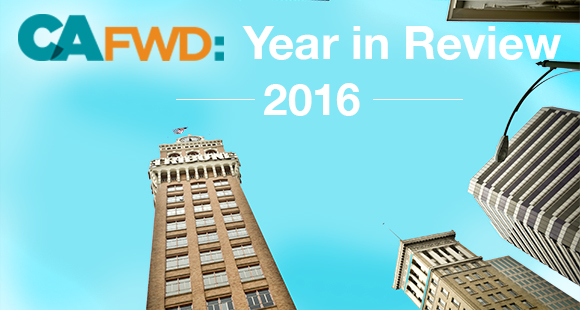
As California Forward looks ahead to 2017, we are optimistic. It's in our nature to be so.
Despite the toxicity of the last election cycle and the deepening of partisan rancor, and perhaps because of it, CA Fwd is more committed than ever to work as it has for the last decade – with all sides to find common ground that can improve governance in California and model those benefits for others.
2016 was a productive year for California Forward (and California!) in the continuous work to restore public trust in government through accountability and transparency.
California voters passed Proposition 54 and Proposition 50, two more positive steps toward a transparent and trustworthy government.
Prop 54 enacted a standard that California Forward has long advocated for: requiring bills to be public for at least 72 hours before a final vote in the Senate and the Assembly. The law also requires every public legislative meeting to be video recorded and posted online, and allows members of the public to make their own recordings.
Voters approved the transparency measure by a wide margin. Legislative leadership unfortunately has taken a narrow interpretation of the requirements, which will cost them politically every time they ignore the public’s will.
In June, voters also passed Prop 50, giving the California Legislature the authority to suspend members without pay on a two-thirds vote. Prior to that, legislators can only vote to suspend with pay. But up until 2014, when three state senators found themselves on the wrong side of the law, the Legislature never had even done that.
CA Fwd worked with the proponent of another potential initiative to advance a legislative solution – SB 1349 – that was signed by the governor and will accelerate modernization of the state’s data platform that allows to public to track campaign contributions and spending.
CA Fwd was created to be the catalytic link between good ideas, sound analysis and visionary recommendations and the actual implementation of policies needed to grow jobs, promote cost-effective public services and create accountability for results.
Two other CA Fwd projects exemplified this mission — one to improve how California pays for elections and the other to simplify California's landmark political ethics law, the Political Reform Act.
After research and consultation with election officials throughout California and the nation, CA Fwd this year proposed a new way to pay for elections administration that could control costs, improve voting systems, and evolve the tense relationship between state and county governments into a cooperative partnership.
Investing in California's Democracy: Building a Partnership for Performance identified a powerful opportunity to replace the “old way of doing things” and reinvest savings in new technologies that can cut election costs and upgrade the voter experience.
CA Fwd also is working with the Fair Political Practices Commission to streamline the Political Reform Act, the state’s landmark ethics law that voters approved more than 40 years ago in response to the Watergate scandal.
The collaboration between the FPPC, UC Berkeley School of Law, UC Davis School of Law, and CA Fwd produced a new version of the venerable law intended to be easier for candidates, community advocates, elected and appointed officials to understand and comply with. The proposal is expected to be introduced as legislation in 2017.
Additionally, to play the role of catalytic leader nationally, CA Fwd launched the 50 State Solution, a project to link the growing political reform work happening in states and communities across the country. In a time of extreme political polarization, this effort aims to provide a platform for connecting conversations about reforms intended to create more responsive, open and representative government.
Each state is different and there is not one uniform solution. But courageous, smart and innovative efforts are underway that have demonstrated the ability to erode partisan calcification, refocus candidates and incumbents on voters, and even reduce the distorting impact of contributions on campaigns and governing. Can you think of a better time than 2017 to double down on making government work for all of the people no matter who is in charge?
While the latest campaign season was divisive and revealed the weaknesses of our democracy, it also reminded us of the importance and imperative of citizenship. We must be the change – in governance and policy and civil discourse – that we want to see in our nation.
Join us in celebrating the potential of 2017, and then let’s get to work!

